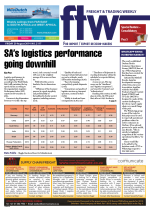No stone has been left
unturned to ensure South
African fruit is citrus black
spot (CBS) free.
After a consignment
of lemons with CBS was
intercepted at the Port of
Rotterdam in July, local
authorities stepped up risk
management processes and
implemented even more
stringent measures. With the
end of the citrus season fast
approaching, hopes are high
these measures will hold up
and that no further cases will
be detected.
According to Stuart
Symington, CEO of the
Perishable Products Export
Control Board (PPECB),
the stricter measures were
implemented at the request
of the European Union which
has placed a limit on the
number of contaminated
exports allowed. Should the
limit be exceeded, all South
African citrus will be banned
from the EU.
“There is much at stake
if we do not get this right,”
Symington told FTW on
the sidelines of a meeting
organised by the Exporters’
Club Western Cape recently.
While the Western Cape
is free of CBS, a local fruit
exporter said it was a very
disruptive situation. “It is
very stressful for everyone in
the citrus industry – whether
you are in a CBS area or not.
It’s imperative that the issue
of CBS be sorted out once
and for all. We can’t just have
additional measures being
introduced. It comes with
major costs.”
It is a sentiment echoed by
role-players across the board.
Earlier this year the Citrus
Growers’ Association (CGA)
said efforts were ongoing
to meet the stringent EU
requirements.
CBS interventions - industry on highest alert
29 Aug 2014 - by Liesl Venter
0 Comments
FTW - 29 Aug 14

29 Aug 2014
29 Aug 2014
29 Aug 2014
29 Aug 2014
29 Aug 2014
29 Aug 2014
29 Aug 2014
29 Aug 2014
29 Aug 2014
Border Beat
Featured Jobs
New
